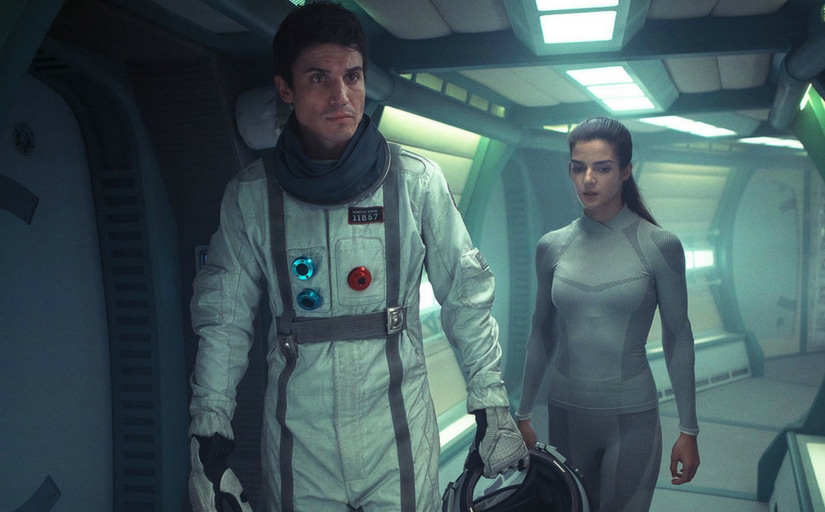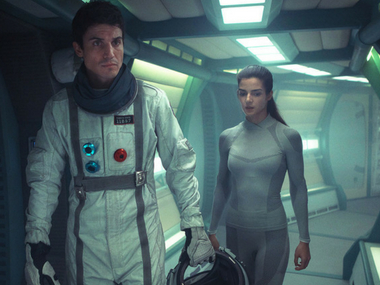Hatem Khraiche’s directorial debut and Netflix’s Spanish language offering, Orbiter 9 is a science-fiction thriller and love story rolled into one that fails to do justice to either genre. On paper, it boasts of a strong cast and an intriguing — if not entirely original — premise the potential of which, unfortunately, dampens with the passage of time. By the time the credits begin rolling, we have witnessed a classic case of what-could-have-been a genuinely cerebral science-fiction film tripping over confusion and a naive desire to please all kinds of audiences. Helena has spent her entire life alone inside a space pod travelling to a colonized planet after Earth became uninhabitable. She finally receives a chance to encounter a human being when a technician visits her pod to undertake some repairs. Alex and her grow close to each other during the trip. He becomes the catalyst for a tectonic shift in her worldview when he reveals to her that the truth of her life is far from what she has been led to believe. A love story under the long shadow of the government, scientists and nefarious, deeply selfish interests ensues. The narrative is generously supplied with twists and turns. Progressing along to a film palette that has had the colour and life leached out of it, we are constantly reminded of the bleakness of the world following an environmental cataclysm. The cinephile can point out a hundred cinematic allusions, homages and inspirations, not all of which are entirely unwarranted. But the film suffers from a complete absence of charm or even a middling sense of humour to break through the crass monotony of the bleak world it presents to the audience. [caption id=“attachment_4481835” align=“alignnone” width=“825”]  A still from Orbiter 9/Image from YouTube.[/caption] Alex’s appearance promises a silver lining, but the love story becomes so crudely enmeshed with a cat and mouse chase that it loses all sense of dramatic proportion. With Helena out to learn the truth about her past, the director is left juggling not less than three distinct genres and themes. The lead performances are assured, bolstered by Belen Rueda’s typically strong supporting act —howsoever under-nurtured her character may appear — but it all fails to come together coherently under the weight of the storyteller’s mounting confusion stirred by the multiple issues, neither of which he wishes to explore at length. To the credit of the director, his commitment to maintain focus on the human element instead of the technology remains constant throughout. Helena’s life has always been surrounded by technology. But once she begins to climb higher on the ladder of truth, technology retreats to the background, a mere tool towards her motive. Khraiche tries to be as empathetic to the worst of his characters as he can, therefore crafting a moral conundrum which, had it been explored deeply, could have done wonders for this film. However, whenever the director has to rely on a more propuslive genre — thriller, in this case — purely to pick up the pace of his narrative, he has messed up. It distracts the viewer from the deliberate pace of Helena’s character study, in effect ruining the film’s emotional impact. Even Clara Lago’s sensitive portrayal of Helena fails to makes her character rise above the narrative mess. Rueda’s character, dropped into the narrative to humanize the massive machine of the system, comes across as a caricature conjured simply to help Alex and Helena escape the labyrinth. In truth, all the twists and turns in the film are quite impactful, believable and genuinely surprising. However, their effect is nullified by the utter incongruence of the events leading up to them. These moments should move us and make us question the seeming imperviousness of the system. We are even aware of an earnest effort on the part of the director to bat for the human lives without conveniently throwing the blame on the government. But in this world comprised almost fully of sharp edges, the total absence of softness, which the filmmaker attempts to override with the love story, and puppeteered characters never allows us to get into the story. People walk in and out of the story at the mercy of a director who wearily employs them as safety valves for a wobbling narrative. In sum, Orbiter 9 is a watchable Netflix effort that could have been fleshed out a lot more to exploit the many ideas it hid beneath its conveniently manipulated narrative. It is let down in the end by a lack of narrative clarity, even while it boasts strong performances from its celebrated cast.
Orbiter 9 is a watchable Netflix effort that could’ve been fleshed out a lot more to exploit the many ideas hidden beneath its manipulated narrative.
Advertisement
End of Article


)
)
)
)
)
)
)
)
)



